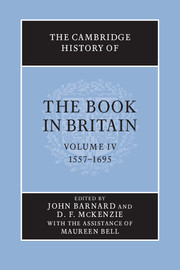Book contents
- Frontmatter
- Dedication
- Contents
- List of illustrations
- List of contributors
- Preface
- Acknowledgements
- Introduction
- RELIGION AND POLITICS
- ORAL TRADITIONS AND SCRIBAL CULTURE
- LITERATURE OF THE LEARNED
- 6 The Latin trade
- 7 Patronage and the printing of learned works for the author
- 8 University printing at Oxford and Cambridge
- 9 Editing the past: classical and historical scholarship
- 10 Maps and Atlases
- 11 The literature of travel
- 12 Science and the book
- 13 Samuel Hartlib and the commonwealth of learning
- 14 Ownership: private and public libraries
- 15 Monastic collections and their dispersal
- LITERARY CANONS
- VERNACULAR TRADITIONS
- THE BUSINESS OF PRINT AND THE SPACE OF READING
- BEYOND LONDON: PRODUCTION, DISTRIBUTION, RECEPTION
- DISRUPTION AND RESTRUCTURING: THE LATE SEVENTEENTH-CENTURY BOOK TRADE
- STATISTICAL APPENDICES
- Abbreviations
- Bibliography
- Index
- Plate Section
- References
6 - The Latin trade
from LITERATURE OF THE LEARNED
- Frontmatter
- Dedication
- Contents
- List of illustrations
- List of contributors
- Preface
- Acknowledgements
- Introduction
- RELIGION AND POLITICS
- ORAL TRADITIONS AND SCRIBAL CULTURE
- LITERATURE OF THE LEARNED
- 6 The Latin trade
- 7 Patronage and the printing of learned works for the author
- 8 University printing at Oxford and Cambridge
- 9 Editing the past: classical and historical scholarship
- 10 Maps and Atlases
- 11 The literature of travel
- 12 Science and the book
- 13 Samuel Hartlib and the commonwealth of learning
- 14 Ownership: private and public libraries
- 15 Monastic collections and their dispersal
- LITERARY CANONS
- VERNACULAR TRADITIONS
- THE BUSINESS OF PRINT AND THE SPACE OF READING
- BEYOND LONDON: PRODUCTION, DISTRIBUTION, RECEPTION
- DISRUPTION AND RESTRUCTURING: THE LATE SEVENTEENTH-CENTURY BOOK TRADE
- STATISTICAL APPENDICES
- Abbreviations
- Bibliography
- Index
- Plate Section
- References
Summary
That branch of the English book trade which imported books from countries outside the king’s (or Queen’s) obedience has traditionally been termed the ‘Latin trade’s It is not known when the term was first used, and is unknown to the Oxford English Dictionary. It was certainly current in the early seventeenth century, and when the Stationers’ Company of London set up in 1616 an organization to import books from Continental Europe, it was known as the ‘Latin Stock’.
The Latin trade was a specialized trade, governed by national and trade regulations, with its own specialized personnel; though Graham Pollard’s dictum, that it was in the hands of aliens who were Brothers of the Stationers’ Company, must now be modified in the light of further evidence. Many such booksellers were aliens and some were Brothers of the Company; but native Englishmen were heavily involved for much of this period, and if they failed to match the skill and contacts of the aliens, they lost money. As far as the Latin trade is concerned, the limits of 1557 and 1695 are arbitrary. Although the Stationers’ Charter of 1557 is silent on the importation of books, the new status of the Company may have emboldened native Englishmen into Continental ventures. The lapse of the Licensing Act in 1695 had little immediate effect upon importing by native booksellers, since for many of them the selling of foreign books was now normal practice, and the ‘anglicization’ of the trade was under way even by 1600. Nevertheless, the Revocation of the Edict of Nantes in 1685 precipitated a further influx of alien booksellers.
- Type
- Chapter
- Information
- The Cambridge History of the Book in Britain , pp. 141 - 173Publisher: Cambridge University PressPrint publication year: 2002
References
- 9
- Cited by



